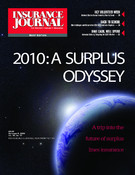The Utah Supreme Court has agreed with a lower court that the state has no ownership in the Workers Compensation Fund other than as one of the 33,000 policyholders.
The court on Tuesday upheld Third District Judge Timothy Hanson’s ruling that the fund’s assets-valued at between $400 million and $600 million-are owned by the employers that are its policyholders.
Lane Summerhays, the fund’s president and chief executive, said the ruling will help keep insurance rates low for the Utah employers.
“Had the fund come under state control, it could have been sold to another party, which could have resulted in higher premiums to employers because the new owner would likely be driven by the profit motive to operate to the benefit of its shareholders, rather than our policyholders,” Summerhays said.
Workers Compensation Fund has 62 percent of the premiums paid in Utah. The fund was created by the Legislature in 1988 as a quasi-public insurer of last resort. The battle for control of the fund began in 2003 when Workers Compensation sued to protect its ownership interests after the Utah attorney general circulated a document at the 2003 Legislature claiming ownership of the fund and its assets.
That move by the state was made allegedly to derail a bill introduced in the 2003 session that proposed to fully privatize the fund.
Fund officials had sought to privatize the fund because its ties with the Utah government had made it difficult for it to continue conducting its out-of-state for-profit business in such states as Idaho, which they say was crucial to keeping Utah insurance rates low.
Last year, the fund offered the state $50 million to settle the lawsuit, but it was rejected by state officials, who said it wasn’t enough to compensate for its interests in the fund.
The state argued that policyholders have no control over the fund’s assets because they don’t elect its board of directors, nor do they have control over distribution of the dividends.
But Associate Chief Justice Michael J. Wilkins wrote in the ruling that the State cannot establish its right to own the fund or its assets merely by attempting to disprove ownership rights of the policyholders.
“As a quasi-public corporation, the WCF exists to serve an essential public purpose, providing workers’ compensation insurance, all the while being private in ownership. Furthermore, apart from the Legislature’s ability to modify its governing statutes, the state has no managerial, financial or operational control of the WCF,” Wilkins said.
Thom Roberts, assistant state attorney general, said he is still reviewing the decision and cannot say what the state’s next step will be. “The significance of the ruling is that the court recognizes the Legislature can still increase or decrease the level of the state’s influence on the fund,” he said. “It’s in the state’s interest to ensure low workers’ comp premiums to benefit local employers.”
However, state Sen. Curt Bramble, R-Provo, said, “This was a $50 million fiasco.” Bramble had tried to get then-Gov. Mike Leavitt and the Legislature to accept the $50 million.
But some, including Dane Leavitt, Mike Leavitt’s brother and head of the Leavitt family insurance empire, believed the state’s interest was as much as $300 million, the money in the fund above what was needed to pay anticipated worker claims.
In 2004, the $50 million buy-out was offered again, but then-Gov. Olene Walker did not accept the compromise bill.
No WCF bill was introduced in the 2005 Legislature.
Copyright 2005 Associated Press. All rights reserved. This material may not be published, broadcast, rewritten or redistributed.
Topics Legislation Workers' Compensation
Was this article valuable?
Here are more articles you may enjoy.


 Allstate CEO Wilson Takes on Affordability Issue During Earnings Call
Allstate CEO Wilson Takes on Affordability Issue During Earnings Call  US Appeals Court Rejects Challenge to Trump’s Efforts to Ban DEI
US Appeals Court Rejects Challenge to Trump’s Efforts to Ban DEI  Florida’s Commercial Clearinghouse Bill Stirring Up Concerns for Brokers, Regulators
Florida’s Commercial Clearinghouse Bill Stirring Up Concerns for Brokers, Regulators  The $3 Trillion AI Data Center Build-Out Becomes All-Consuming for Debt Markets
The $3 Trillion AI Data Center Build-Out Becomes All-Consuming for Debt Markets 


